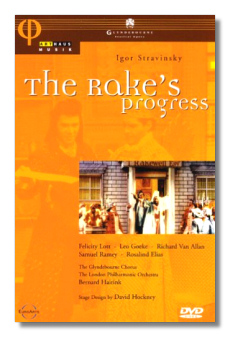
The Internet's Premier Classical Music Source
Related Links
- Stravinsky Reviews
- Latest Reviews
- More Reviews
-
By Composer
-
Collections
DVD & Blu-ray
Books
Concert Reviews
Articles/Interviews
Software
Audio
Search Amazon
Recommended Links
Site News
 DVD Review
DVD Review
Igor Stravinsky

The Rake's Progress
- Felicity Lott – Anne Trulove
- Leo Goeke – Tom Rakewell
- Richard Van Allan – Trulove (Anne's father)
- Samuel Ramey – Nick Shadow
- Rosalind Elias – Baba the Turk
- Nuala Willis – Mother Goose
- John Fryatt – Sellem
- Thomas Lawlor – Keeper of the Madhouse
- John Cox – Stage production
- David Hockney – Set Designs
The Glyndebourne Chorus
The London Philharmonic Orchestra/Bernard Haitink
Arthaus Musik DVD 101093 LPCM Stereo Full Screen
When this opera was premièred in 1951, Stravinsky was charged with being out of fashion, his neo-Classical style by then considered old hat and in need of some new twist. The composer took notice and quickly turned to a more advanced expressive manner with Canticum Sacrum, and eventually to serial music with his ballet Agon. Though these works have worthwhile aspects, I'm convinced Stravinsky wasted his time in treading onto this more modern, more alien turf. He should have stuck to neo-Classicism since it had become as integral and natural to his musical persona as Classicism had to Haydn and Mozart.
This 1975 live performance is an account of the famous Glyndebourne production by John Cox of The Rake's Progress that featured sets by the now well-known British artist, David Hockney. Some casual viewers might think the set designs cheap, but they are deftly-imagined and in the spirit of the opera, since they are based on the creations of 18th-century artist William Hogarth, whose collection of paintings, also titled The Rake's Progress, inspired Stravinsky to write this opera. Still, I'm not sure the sets' plainness and barren look wear well as the performance proceeds, but they are not a major drawback and might even be counted an asset.
The opera, with a libretto by W.H. Auden and Chester Kallman, shows the decline of country boy Tom Rakewell, who inherits a fortune at the outset, courtesy of the Mephistophelian Nick Shadow, his new friend and constant tempter and nemesis throughout the story. Descending into a dissolute life of whoring and gambling, Tom marries a bearded lady (Baba the Turk), but his innocent sweetheart, Anne Trulove, never abandons hope of his return. In the end, Tom is spared from being dragged to hell, but must pay a price still – he goes mad and winds up in Bedlam. The singing here is quite impressive, with Felicity Lott turning in as fine an Anne Trulove as you're likely to encounter on DVD. Ditto for Rosalind Elias as Baba the Turk. She is simply an utter delight. Samuel Ramey makes a good Nick Shadow, too, and Leo Goeke is also effective as Rakewell. Despite the 1975 origins, the sound is vivid and detailed and the camera work excellent.
While Stravinsky was hardly a tunesmith and could barely offer enough thematic interest in a work of a half-hour length, let alone the nearly two-and-a-half hour duration of this opera, he was nevertheless able to capture the wit and satire of the story in writing that is always brilliantly-imagined and reminiscent of Oedipus Rex and his ballet Jeu de Cartes. Needless to say, this DVD is highly recommended.
Copyright © 2005, Robert Cummings




















